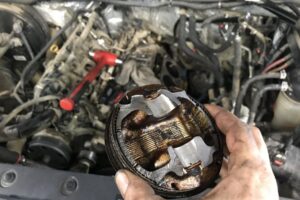When a car makes noise when starting, it can be a cause for concern. However, if the noise goes away shortly after starting, it may not be as alarming. Many drivers experience this issue, and it can be caused by a variety of factors.
One of the most common reasons for a car to make noise when starting and then go away is due to engine components. Engines are not designed to last forever, and a knocking or rattling sound on a cold start might be a warning sign for deeper issues.
Other factors that can cause this issue include timing belt problems, sticky lifters, or a lack of oil pressure. It’s important to identify the root cause of the issue to prevent any further damage to the vehicle.
Why Does My Car Make Noise When Starting?

Starting up your car should be a smooth and quiet process. However, if you hear strange noises when you turn the key, it can be concerning. Here are some common causes of car noises during startup:
Common Causes
- Faulty Starter Motor: A clicking noise when starting your car could indicate a faulty starter motor. This is usually caused by a low battery charge or a faulty solenoid.
- Worn-out Drive Belt: If your car makes a screeching noise when starting, it could be due to a worn-out drive belt. This belt connects the engine to the alternator, power steering pump, and other components. Over time, it can become loose or damaged, causing a loud noise during startup.
- Engine Knock on Startup: If you hear a knocking sound when starting your car, it could be due to an engine knock. This is caused by the fuel and air mixture igniting unevenly in the engine cylinders. This can be caused by low-quality fuel, incorrect spark plugs, or carbon buildup in the engine.
- Piston Slap: A rattling noise during startup could be due to piston slap. This is caused by the piston moving around in the cylinder, causing a knocking noise. This can be caused by worn-out engine bearings or a damaged piston.
- Sticky Valve Lifter: If you hear a ticking noise during startup, it could be due to a sticky valve lifter. This is caused by a buildup of dirt or sludge in the engine oil, preventing the valve lifter from functioning correctly.
These are just a few of the most common causes of car noises during startup. If you’re experiencing any of these issues, it’s best to take your car to a mechanic for diagnosis and repair.
How to Diagnose the Problem

As JD Power suggests, it is crucial to diagnose the problem before proceeding with mechanical repairs. Identifying the issue is essential for a successful and effective fix.
If a car makes noise when starting then goes away, it could be a sign of a deeper issue. Here are some steps to diagnose the problem:
Checking Engine Components
The first step is to check the engine components. A knocking sound or rattling noise on a cold start might be a warning sign for deeper issues.
Check the timing belt, as it is responsible for controlling the rotation of your engine’s internal components, and if it slips or breaks, it can cause damage to those components.
Another possible cause of the noise could be sticky lifters. Lifters are the moving parts of the valve train that open and close the intake and exhaust valves.
If they become sticky, they can cause a knocking sound on startup. Check the valve train and make sure everything is lubricated and moving smoothly.
Fluid Levels and Leaks
Another possible cause of the noise could be low fluid levels or leaks. Check the oil level, as low oil levels can cause engine noise.
If the oil level is low, add more oil and see if the noise goes away. Also, check for any leaks in the engine, transmission, or other parts of the car. Leaks can cause damage to the engine and other components, so it’s important to fix them as soon as possible.
Under the Hood Inspection
Finally, perform an under the hood inspection. Look for any loose or damaged parts, such as belts, hoses, or pulleys. Check the battery terminals, as loose or corroded terminals can cause starting issues. Make sure the air filter is clean and free of debris, as a dirty air filter can cause engine noise.
In conclusion, if a car makes noise when starting then goes away, it’s important to diagnose the problem as soon as possible. Check the engine components, fluid levels and leaks, and perform an under the hood inspection to identify the issue and fix it before it becomes a bigger problem.
Fixing the Issue

If your car makes a noise when starting then goes away, it is important to address the issue promptly to prevent further damage to your vehicle. Here are some DIY fixes and when to see a mechanic.
DIY Fixes
A loose or worn drive belt can cause a squealing noise when starting the engine. Check the drive belt for any signs of cracks or fraying.
If the belt is loose, adjust the tension or replace it if necessary. A worn water pump or alternator bearing can also cause noise during startup. Check the bearings for any signs of wear and replace them if necessary.
Sticky lifters can cause a knocking noise on startup. Try using an oil additive or changing the oil to a different brand or weight to see if it helps. If the problem persists, it may be necessary to have a certified mechanic diagnose and repair the issue.
When to See a Mechanic
If the noise persists after attempting DIY fixes, it may be necessary to have a certified mechanic diagnose and repair the issue. Here are some potential causes that may require professional attention:
- Faulty power steering pump or bearings
- Timing belt or rod knock
- Exhaust manifold leak
- Ignition or pulley issues
- Worn engine components or main bearing wear
- Low engine oil or oil pump issues
- Worn engine mounts or valves
- Faulty starter or battery terminals
Based on my experience as a mechanic, I can assure you that replacing a starter is a routine and reasonably priced task. This brings the good news of affordability, giving you peace of mind.
Additionally, vibrations during startup could indicate an issue with the transmission or driveshaft, while friction noises could indicate low engine oil or other issues. A certified mechanic can diagnose and repair these issues to ensure your vehicle is running smoothly and safely.
Explore our informative blog post on Troubleshooting a Car That Won’t Start: No Clicking, No Noise.
In Closing
Car engines can make noise when starting and then go away for various reasons. Some of the most common causes of this issue are loose belts, piston slap, sticky lifters, and worn-out spark plugs.
If the noise goes away after a few moments, it is usually not a cause for concern. However, if the noise persists or gets worse, it may be a sign of a more serious issue that requires the attention of a mechanic.
Regular maintenance and inspections can help prevent many of the issues that can cause a car engine to make noise when starting. It is important to follow the manufacturer’s recommended maintenance schedule and address any issues promptly to ensure the longevity and reliability of the vehicle.
If you are unsure of what is causing the noise or how to fix it, it is best to take your vehicle to a trusted mechanic or auto repair shop. They can diagnose the issue and provide the necessary repairs to get your car running smoothly again.
Overall, it is important to pay attention to any unusual noises or behaviors from your car and address them promptly to avoid more serious issues down the road.
By taking good care of your car and addressing any issues as soon as they arise, you can enjoy a safe and reliable driving experience for years to come.

![Car Having Trouble Starting [Causes and How to Fix] car having trouble starting](https://roadsumo.com/wp-content/uploads/2021/09/car-having-trouble-starting-150x150.jpg)



![Battery Light on Dashboard [9 Reasons Why It's On] battery light on dashboard](https://roadsumo.com/wp-content/uploads/2022/03/battery-light-on-dashboard-150x150.jpg)
![Why Is My ABS Light On? [7 Common Reasons] why is my abs light on](https://roadsumo.com/wp-content/uploads/2022/04/why-is-my-ABS-light-on-150x150.jpg)


![Read more about the article How to Rev a Car Engine [Automatic and Manual]](https://roadsumo.com/wp-content/uploads/2022/03/how-to-rev-a-car-engine-300x200.jpg)